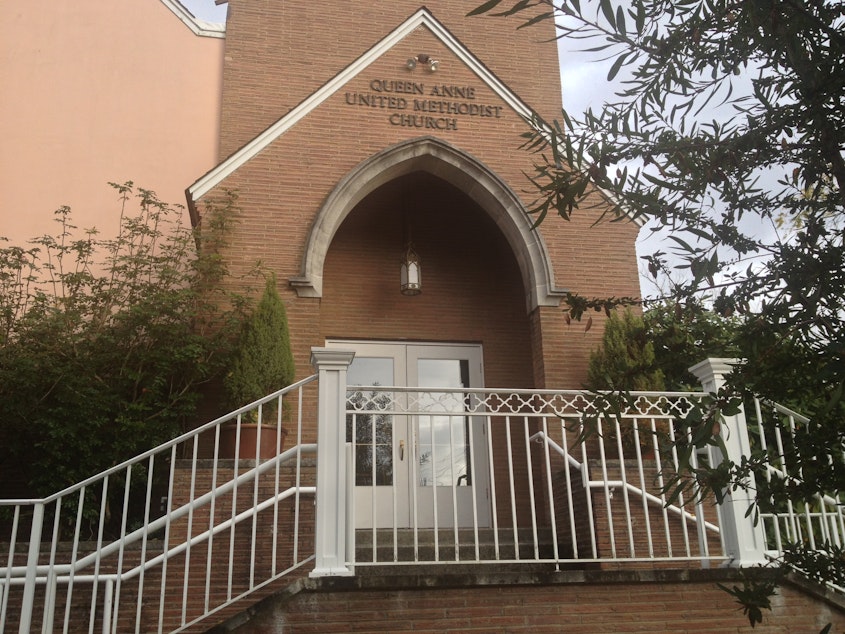How The Gun Debate Plays Out In Faith

Charles Stephens performed opera in New York City for 20 years. He sang with the Seattle Symphony on opening night. But Stephens says that doesn’t compare to the concert he recently directed last month.
In June, Stephens was supposed to direct a show at Seattle Pacific University, but the tragic shooting disrupted those plans. Deeply affected, Stephens decided to reschedule the concert as a fundraiser for the Washington Alliance for Gun Responsibility, the main group supporting Initiative 594 on the ballot this November. If passed, the initiative would institute comprehensive background checks on firearms.
Stephens approached Pastor Katie Ladd and asked if he could use her church, the United Methodist Church in Queen Anne, as a performance space.
Ladd felt like it was her responsibility as a Christian to support the cause, so she said yes. “When asked what the greatest commandment was, Jesus says, ‘Love the Lord God with all of your heart, your mind, your soul and your strength and your neighbor as yourself,’” she said. “It seems to me, it’s pretty basic thing to say that we don’t want to kill one another.”
This November, Washingtonians will vote on two opposing initiatives on background checks for firearms: 591 and 594. In the run up to the election, some of the leading voices have come from religious organizations.
Sponsored
But Wayde Hager, a member of the Church of Christ in Vancouver, thinks that the role of the church should not turn political. When background checks were brought before the Washington State Legislature in February 2013, Hager took a day off his job at Intel to testify before lawmakers. He believes that the Bible supports the use of guns, pointing to an old Israeli law that allowed Israelites to kill house intruders without reprimand.
However, Hager said that since there is not a theological consensus on gun rights, Christian leaders shouldn’t be organizing events like Ladd’s classical music concert.
Ladd said that Jesus himself was given the name of Prince of Peace, which was a political title. “The idea that religion isn’t political is at best naïve,” she said. “But to be a follower of Jesus is to stand with the poor and the marginalized and the broken places of this world and to act for change.”
Christians are not the only ones getting involved in the gun rights debate. An interfaith organization, the Faith Action Network, is one of the biggest supporters of I-594 and the Sikh Centre of Seattle is one of their key members.
The Sikh community originates from the Punjab region of Northern India, where it faced persecution. Because of that oppression, early Sikh leaders prescribed the idea that Sikhs can be both a person of faith and someone who protects themselves and others. It is called the saint-soldier model.
Sponsored
Jaswinder Singh, a volunteer at the Sikh Centre, emphasizes that you need to do a certain amount of meditation before becoming a soldier. “We think of weapons as peacemakers. They are only a peacemaker if you have a certain amount of stability in your head,” Singh said.
He added that back in India, every gun owner must go through an extensive background check and apply for a license before obtaining a firearm. Since that system is what Sikhs are used to, Singh thinks that most Sikhs favor background checks.
According to the state’s Public Disclosure Commission website, religious organizations have donated $3,350 to the I-594 campaign. In contrast, the I-591 campaign has yet to receive a donation from a religious group.
Hager thinks that people on his side of the issue, but just by design, will not openly support a political campaign.
“The pastor in my church, there’s no way he’s going to get involved," Hager said. "He probably has an opinion, but if you went up there and starting talking like, ‘You should vote this way,’ people would say, ‘What are you doing? This is the time to talk about God, this is time to talk about our faith.’”
Sponsored
For more KUOW elections coverage, visit the Election Connection page.
